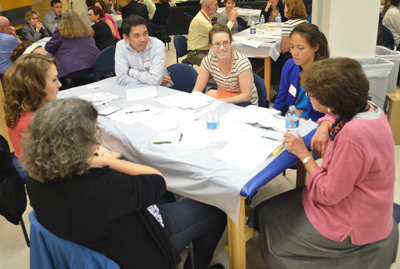IPE Approach Improves Treatment of Seniors
Students and faculty took an interprofessional approach to geriatric care at a case conference organized by the Geriatrics and Gerontology Education and Research (GGEAR) Program of the University of Maryland, Baltimore (UMB), in October.
About 80 students from all disciplines of UMB’s schools gathered at the Allied Health Professional Building on Penn Street to consider from all angles the case of a frail senior patient. Eight faculty members from the schools of medicine, law, pharmacy, nursing and social work facilitated the students’ work, encouraging them to consider the case using the lens of their own disciplines as well as others.
Reba Cornman, MSW, director of GGEAR, organizes at least one such conference each year, in addition to the one she leads at UMB’s annual Interprofessional Education (IPE) Day each winter. The program also conducts such events on-site at nursing homes and rehabilitation facilities. Faculty begin planning for the autumn conference in the summer, Cornman said.
“We’re trying to get them think about this case – about assessing and intervening -- from the different disciplines’ perspectives,” said Cornman. “A lot of them don’t know what each other does. This is a relaxed opportunity for the students to learn about each other. We want to give them a flavor for it. We hope that they continue to use this as a reference point for interprofessional thinking during the remainder of their education as well as their future careers.”
The case the students considered was that of a 65 year old African American man with a history of schizoaffective disorder. The man was being treated at the Baltimore Veterans Administration Medical Center for symptoms including slurred speech, unstable gait, confusion and difficulty finding words. He had a history of drug abuse as well as severe mental illness. Neurology had established that he had not recently had a stroke. Though he had been discharged into assisted living, his confusion had worsened and on the day he was readmitted to the VA, he had wandered into traffic. Now the hospital staff was faced with the decision of whether or not to release him back to assisted living.

Students confer with Reba Cornman, MSW, about a geriatric case study at the GGEAR IPE conference.
Sitting in groups at a cluster of tables, the students considered the best method of proceeding with such a patient. The faculty members circulated in the room, asking questions and offering advice. They had introduced themselves to open the conference, each offering their own thoughts about the particularly complicated nature of geriatric work in each discipline.
“In 1900, the average lifespan was 40 years,” said David Williams, DDS, MPH, assistant professor at the School of Dentistry. “Now, it’s twice that. The mouth and oral cavity is the window to the rest of the body,” and many diseases that come with age surface first in the mouth, he added.
Social workers have particularly complicated tasks in the hospital setting, said Kelley Macmillan, MSW, PhD, clinical associate professor and chair of the aging specialization at the School of Social Work. Social workers have to think about a patient’s post-hospital needs, both medical and otherwise, and act as a liaison between patient, family and needed resources. “Many times, we are the representative advocating for what the patient wants,” said Macmillan.
Ellen Gallegary, JD, founding director of Callegary & Steedman, PA, was an assistant state’s attorney “back when mental patients did not have the right to refuse treatment,” she said. “My perspective is one of representing the autonomy of human beings with impaired decision making.”
Stephanie Callinan, PharmD, a second-year geriatric pharmacy resident with the School of Pharmacy, spoke about how older patients can have different reactions to drugs than younger patients. “Older adults are much more sensitive to the efficacy of drugs as well as the side effects,” she said.
Nancy Lerner, DNP, RN, CDONA, an assistant professor with the School of Nursing, described the unique role of nurses in long term care, her specialty. “Nurses are the people at the bedside who spend the most time with patients,” she said.
David Loreck, MD, assistant professor at the School of Medicine, designed the case considered at the conference, based upon his work in geriatric psychiatry at the Baltimore VA Medical Center. “I don’t think elderly folks get very good care in our health care system,” he told the students. “Things like a history in an exam are becoming a lost art.” Loreck urged the students to think thoroughly and creatively about the patient.
Also from the School of Medicine was Vincent Conroy, PT, DScPT, an assistant professor of physical therapy and rehabilitation science. He described working with patients to ensure they are as strong as possible after leaving the hospital. “My role is to assess current function and improve that level of care so that the individual can transition to the next level of care,” he explained.
In their small groups, the students discussed the complex issues related to treating and planning next steps of care for an older, mentally ill patient with a complicated history. They focused on medical elements such as the patients mobility as well as more complicated psychosocial and even legal matters such as his competency. They wondered if they could discuss the patient’s history with his daughter, or if they would have to secure his permission to stay in compliance with the Health Insurance Portability and Accountability Act (HIPAA). They wondered if he was competent to give his consent on issues such as discussing his case with his daughter. That discussion led to questions about how to even establish competency in such a complicated situation.
Older patients can be particularly challenging, making a thorough interdisciplinary approach even more important in geriatrics, explained Cornman. “There are so many difficult, complex patients out there, so many people who confront horrible situations in their lives like this one,” Cornman said, describing the case at hand. “Geriatrics certainly lends itself beautifully to inteprofessionalism.”



